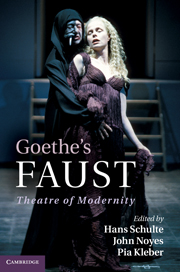Book contents
- Frontmatter
- Contents
- List of illustrations
- List of contributors
- Preface
- List of abbreviations
- Introduction
- PART I MODERNITY
- 1 Faust – today
- 2 Mephisto and the modernization of evil
- 3 Mephisto is the devil – or is he?
- 4 ‘Schwankende Gestalten’: virtuality in Goethe's Faust
- 5 Amnesia and anamnesis in Goethe's Faust
- 6 Magicians of modernity: Cagliostro and Saint-Simon in Goethe's Faust II
- 7 The blind Faust
- 8 From Faust to Harry Potter: discourses of the centaurs
- 9 Mistra and the Peloponnese in Goethe's Faust II
- 10 Goethe and the grotesque: the ‘Classical Walpurgis Night’
- 11 Re-defining classicism: antiquity in Faust II under the sign of the Medusa
- 12 Diabolical entrapment: Mephisto, the angels and the homoerotic in Goethe's Faust II
- PART II THEATRE
- Select bibliography
- Index
- References
3 - Mephisto is the devil – or is he?
Published online by Cambridge University Press: 01 June 2011
- Frontmatter
- Contents
- List of illustrations
- List of contributors
- Preface
- List of abbreviations
- Introduction
- PART I MODERNITY
- 1 Faust – today
- 2 Mephisto and the modernization of evil
- 3 Mephisto is the devil – or is he?
- 4 ‘Schwankende Gestalten’: virtuality in Goethe's Faust
- 5 Amnesia and anamnesis in Goethe's Faust
- 6 Magicians of modernity: Cagliostro and Saint-Simon in Goethe's Faust II
- 7 The blind Faust
- 8 From Faust to Harry Potter: discourses of the centaurs
- 9 Mistra and the Peloponnese in Goethe's Faust II
- 10 Goethe and the grotesque: the ‘Classical Walpurgis Night’
- 11 Re-defining classicism: antiquity in Faust II under the sign of the Medusa
- 12 Diabolical entrapment: Mephisto, the angels and the homoerotic in Goethe's Faust II
- PART II THEATRE
- Select bibliography
- Index
- References
Summary
This question seems too obvious to be stated and discussed seriously. Doesn't Faust refer to Mephisto as the devil several times, as when he says ‘Who holds the Devil, hold him tight!’ (1428)? Does not even Mephisto repeatedly call himself ‘devil’, as after his liberation: ‘You are not yet the man to hold the devil captive’ (1509)? There should not be any doubt about Mephisto's origins. Nevertheless, having the question of Faust's modernity in mind – a modernity which, inspired by Nietzsche, has developed a more differentiated view on what is good or evil – it may be worth playing the role of the advocatus diaboli and arguing that the hellish client is not the devil, or, at least, not in the common sense: that is, not as evil personified. It can in fact be argued that he even incorporates characteristic traits of some honorable individuals. Recapitulating Mephisto's deeds and actions, one has to conclude that he performs pranks and jokes rather than committing crimes. What does he actually do after signing the pact with Faust? He gives amusing academic advice to a would-be student, he fools the tipplers of Auerbach's cellar, he prescribes a rejuvenation drug for Faust, he organizes some gifts for Gretchen, he encourages Faust to face Valentin in self-defence and he provides horses for Gretchen's prison escape. The only possibly illegal act in the first part is the testimony asserting Mr Schwerdtlein's death, but even this is questionable.
- Type
- Chapter
- Information
- Goethe's FaustTheatre of Modernity, pp. 40 - 53Publisher: Cambridge University PressPrint publication year: 2011
References
- 1
- Cited by



